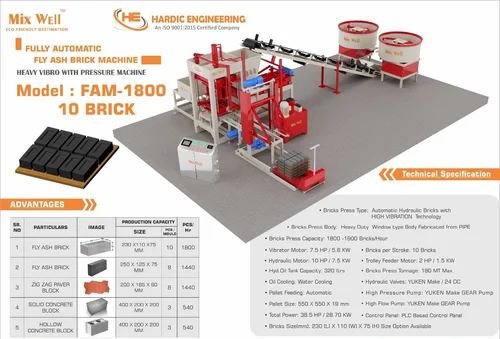
The Fly Ash Brick Making Machine is an advanced piece of construction machinery designed to produce eco-friendly, high-strength bricks using fly ash, a by-product from thermal power plants. As conventional clay bricks strain natural resources like topsoil, fly ash bricks provide a sustainable alternative for modern construction.
These machines are engineered to compress fly ash, cement, stone dust, and water into uniform-sized bricks using hydraulic, mechanical, or vibration-based systems. Depending on the level of automation, these machines can be manual, semi-automatic, or fully automatic, catering to different production needs.
Due to increasing demand in real estate, infrastructure, and smart cities, fly ash brick machines are rapidly becoming essential for brick manufacturers, contractors, and developers.
India is one of the top manufacturers and exporters of fly ash brick making machines. Major hubs include:
Gujarat (Ahmedabad, Morbi)
Tamil Nadu (Coimbatore)
Uttar Pradesh (Noida, Ghaziabad)
Maharashtra (Pune, Nagpur)
West Bengal (Kolkata)
3. Types of Fly Ash Brick Making Machines
| Type | Operation Style | Capacity/Day | Suitable For |
|---|---|---|---|
| Manual | Hand-operated | 1,000 2,000 bricks | Small workshops |
| Semi-Automatic | Button/pedal-based | 3,000 6,000 bricks | Mid-sized production units |
| Fully Automatic | PLC-controlled system | 8,000 20,000 bricks | Large-scale manufacturers |
| Hydraulic Press Type | High pressure (2050T) | Variable | High-strength bricks |
Fly Ash Primary ingredient (6070%)
Cement Binder (812%)
Water For mixing
Lime or Gypsum (optional) For strength improvement
Some advanced machines also support coloring and patterning for aesthetic bricks.
Fly ash bricks produced by these machines are used in a wide range of construction activities:
Residential buildings Walls, partition walls, basements
Commercial buildings Schools, offices, shopping complexes
Infrastructure projects Roadsides, boundary walls
Government & smart city projects Affordable housing schemes (PMAY)
5.2 Replacement for Clay Bricks
Fly ash bricks are lighter, more uniform, and environmentally friendly compared to clay bricks.
Utilizes fly ash, which is a hazardous industrial waste, reducing pollution.
No topsoil excavation like clay bricks.
Lower raw material cost
Minimum labor for high output (in automatic variants)
Machines can produce up to 20,000 bricks/day depending on the model.
Bricks made with hydraulic press systems are crack-resistant and high in load-bearing capacity.
Uniform size and shape reduce mortar usage and increase wall strength.
Machines come with interchangeable molds for standard and custom sizes.
Machines built with heavy-duty steel and industrial-grade components for long-term usage.
PLC-based panels, automated feeding, and stacking systems make operation simple and fast.
| Feature | Description |
|---|---|
| Hydraulic System | Provides consistent and uniform pressure for brick shaping |
| Vibratory System | Ensures compact bricks with minimal air gaps |
| Mold Change System | Quick mold switch for different shapes/sizes |
| Automation | Full automation with PLC, SCADA, or HMI panels |
| Raw Material Feeder | Hopper and conveyor systems for continuous material input |
| Pallet Feeder & Stacker | Automates collection and stacking of finished bricks |
| Material Mixer | Twin-shaft or pan mixer for perfect blending |
| Energy Efficient Motors | Reduces power consumption, available with single or three-phase options |
| Production Capacity | 1,000 20,000 bricks per 8-hour shift (based on model) |
| Power Requirement | Varies from 10 HP to 75 HP depending on size |
| Parameter | Value |
|---|---|
| Power Requirement | 4060 HP |
| Hydraulic Pressure | Up to 200 Tons |
| Cycle Time | 1015 seconds |
| Number of Bricks/Stroke | 4 to 12 bricks |
| Production per Shift | 8,000 20,000 bricks/day |
| Automation Type | PLC-based Touchscreen Control |
| Brick Size (mm) | 230 x 110 x 75 (Customizable) |
A: Fly ash is a by-product from coal-fired power plants. It is rich in silica and alumina, making it ideal for brick making. It improves workability, reduces water usage, and produces lighter and stronger bricks.
A: Yes. Fly ash bricks are:
Lighter in weight
Higher in strength
Eco-friendly
Cost-efficient
A: Typically, fly ash bricks require 2128 days of curing to reach maximum strength. Steam curing chambers can reduce this time to 7 days.
A: Prices vary depending on size and automation level:
Manual Machine: ?1.5 ?3 lakh
Semi-Automatic Machine: ?4 ?10 lakh
Fully Automatic Machine: ?12 ?50+ lakh
A: Yes. Government schemes under MSME, PMEGP, and Startup India may offer subsidies from 15% to 35% for machinery setup, especially in green building sectors.
A: A small plant can run on 1,5002,000 sq. ft., while fully automatic setups need 10,000+ sq. ft., including curing and storage areas.
A: Yes. Most manufacturers provide onsite installation, operational training, troubleshooting support, and after-sales services.
A: With proper maintenance, machines can last 1015 years or more.
A: Yes, by changing molds, you can produce:
Standard bricks
Interlocking bricks
Paver blocks (in some models)
A: Due to low raw material cost and high demand, ROI can be achieved in 1218 months, depending on production capacity and sales strategy.
The Fly Ash Brick Making Machine is not just a piece of equipmentit's a gateway to sustainable construction, entrepreneurship, and urban development. With the increasing demand for green building materials, these machines offer a profitable and eco-conscious way to serve infrastructure needs while minimizing environmental impact.
From manual to fully automatic systems, there's a solution available for every scale of business whether you're a startup, contractor, or a full-scale manufacturer.
Contact Info:-+91 99042 01922 / 9898474351
Website:- https://mixwellbrickmachine.com
Gmail:- mixwellindia@gmail.com
Instagram:- https://www.instagram.com/flyashbrickmachine/
Facebook:- https://www.facebook.com/MIXWELLHARDICENGINEERING/
Youtube:-https://www.youtube.com/user/HARDICify/videos
Office Address
C-1, 77/1, Kaka Estate, Ambicanagar Road, Nr. National Plastic, Odhav, Ahmedabad β 382415, Gujarat, India.
Factroy Address
24, Shreeji Estate Near Sankalp Estate, Bakrol Cir, Ahmedabad-382430, Gujarat, India
mixwellindia@gmail.com
hardicengineering@gmail.com
+91 99042 01922
+91 98984 74351
Also Send Mail
© Hardic Engineering . All Rights Reserved.
